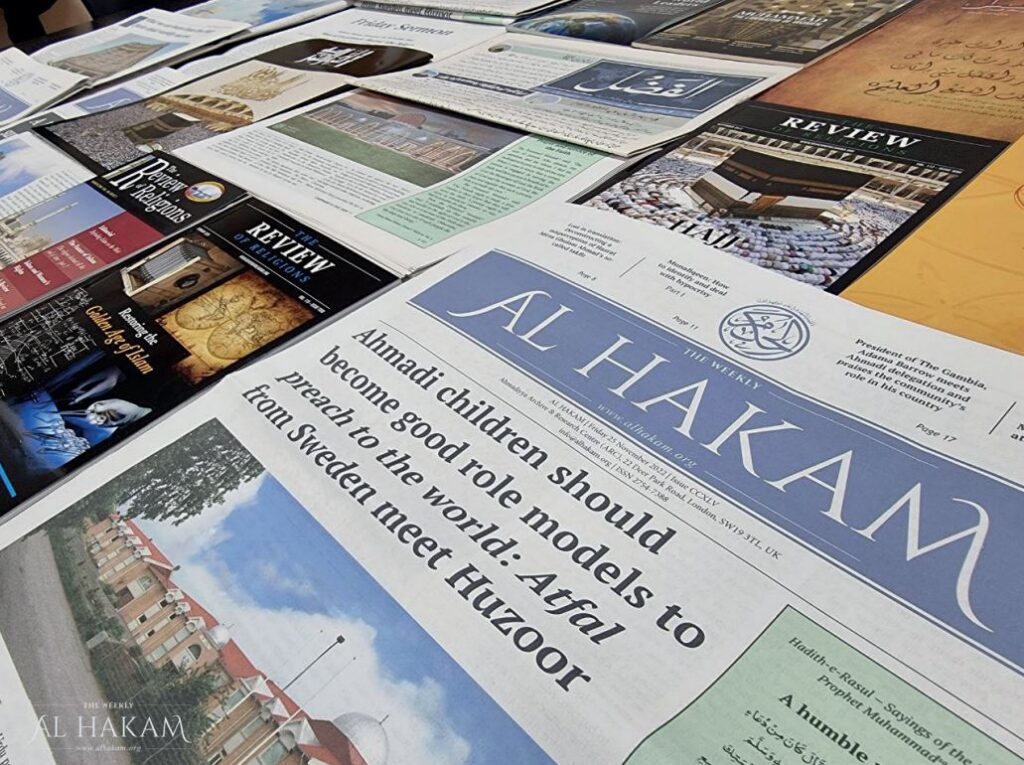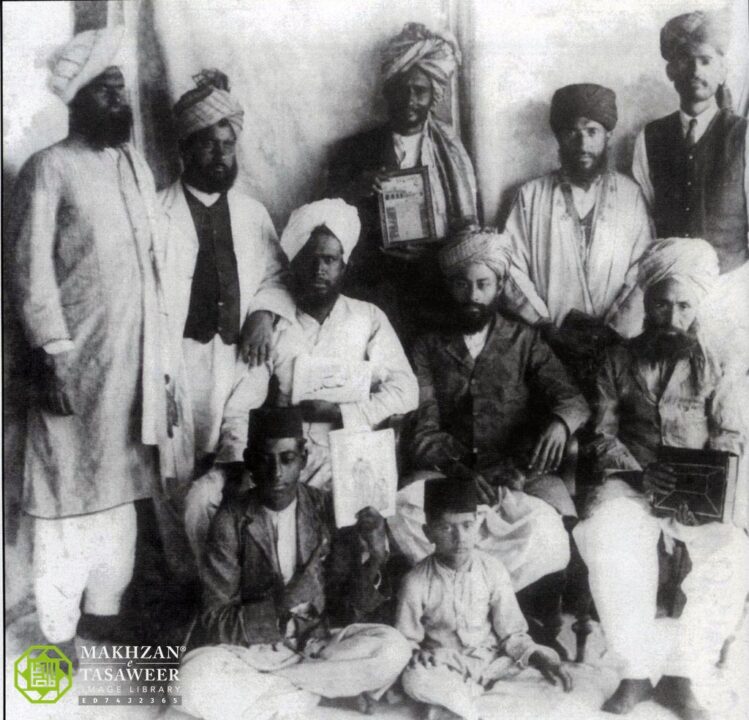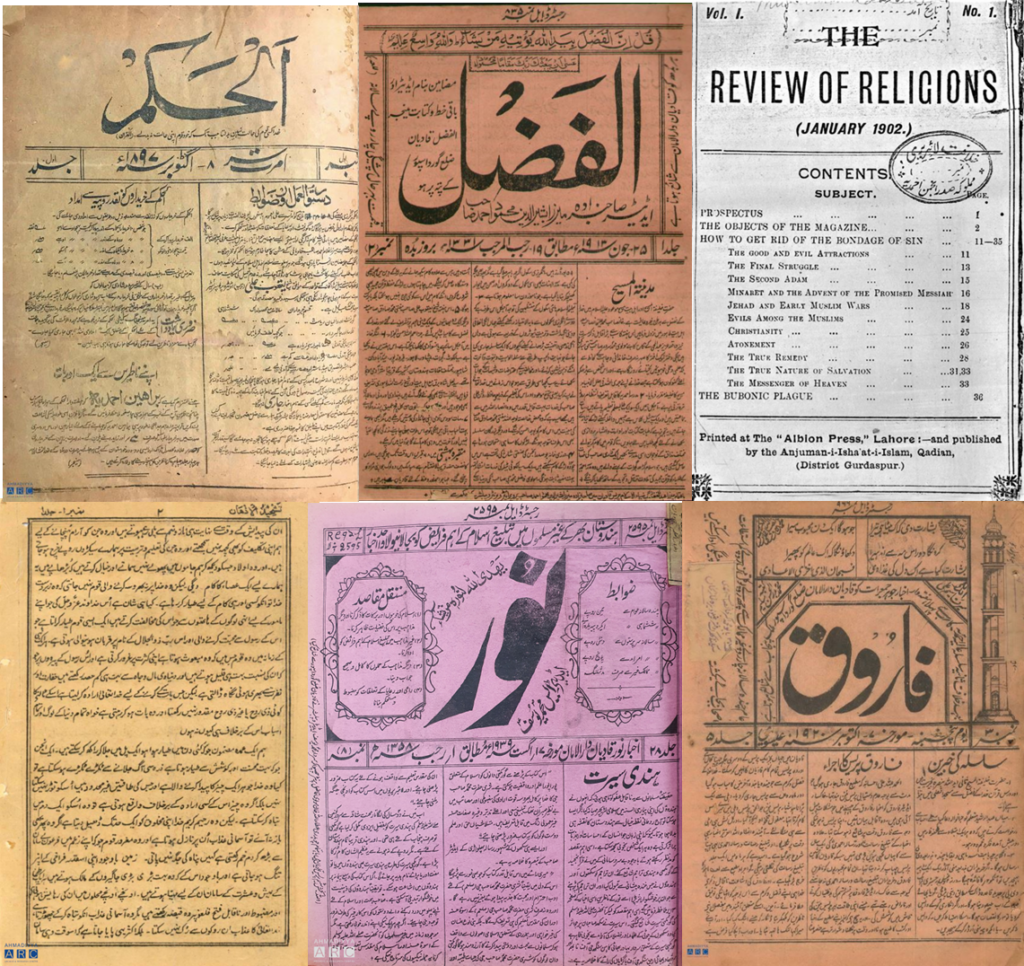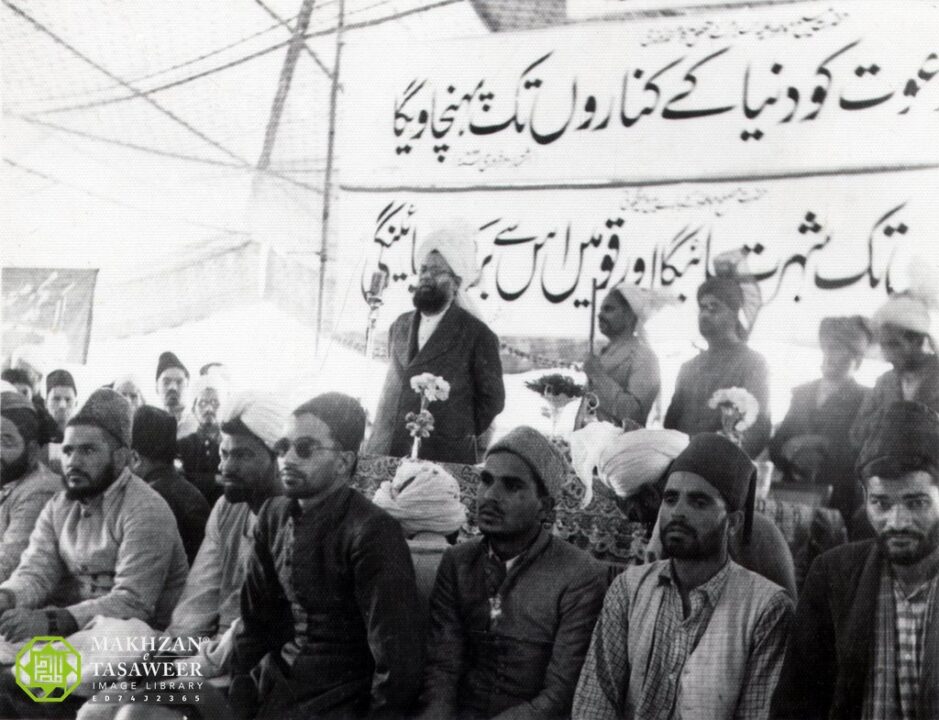Ata-ul-Haye Nasir, Al Hakam

On 27 December 1919, Hazrat Musleh-e-Maud, Mirza Bashiruddin Mahmud Ahmadra delivered an address at the Jalsa Salana Qadian.
During his address, Huzoorra spoke about the importance of the Jamaat’s periodicals, and said:
“I advise you with great emphasis that during this era, it is an absolute negligence to not pay attention to this means of the propagation of religion. [One must remember] what Hazrat Sahibas [the Promised Messiah] said about the newspapers, and what titles he gave them. He used to say that ‘Al Hakam and Badr are my two arms.’ […]
“Therefore, I ask you on behalf of the newspapers that you should subscribe to them and assist their editors. Not only should literate people subscribe to them, but even those who cannot read should buy the newspaper and request someone else to read it out for them. […]
“I once again advise you to pay attention to Al Fazl as well, which is an organ of our Jamaat, and to [The] Review [of Religions] – about which I can say nothing more than what has been said by Hazrat Sahibas. Then, there are Nur, Faruq, Tash-heez-[ul-Azhan], and Al Hakam. These four have been doing a great job.
“In regards to Al Hakam, I would say that it is still continuing its efforts like a twinkling lamp [chiragh]. Its steadfastness is also very commendable. I am well aware of its financial situation, and I even know that sometimes its management has to face a hand-to-mouth situation, however, they have never given up despite these circumstances.” (Anwar-ul-Ulum, Vol. 4, p. 476)
On 27 December 1920, during his address at the Jalsa Salana Qadian, Huzoorra said:
“I wish to speak about the Jamaat’s newspapers and magazines. Last year, I urged the members that they should subscribe to them. As a result, though there was some attention towards Al Fazl, [The] Review [of Religions], and Tash-heez-[ul-Azhan], there was not much attention towards other [periodicals]. The number of subscribers to Al Hakam, Nur, and Faruq is very small. I advise you all to pay attention to subscribing to them, though I also wish to advise their volunteers to improve and make [those periodicals] more beneficial.” (Islah-e-Nafs, Anwar-ul-Ulum, Vol. 5, p. 415)
In regards to Al Hakam, Huzoorra said:
“It has been a characteristic of Al Hakam […] that it preserves the history of the Jamaat, and strives to instil a [new] spirit within the Jamaat.” (Ibid)
In 1934, when the publication of Al Hakam resumed after a break, Hazrat Musleh-e-Maudra wrote a letter to Hazrat Sheikh Yaqub Ali Irfanira – dated 7 January 1934 – and said:
“Al Hakam is the first ever newspaper of the Jamaat and the service it has rendered, as well as Badr in the last years of the Promised Messiahas, can never again be accomplished by any other newspaper, even in exchange for millions of rupees.
“I declare that whether Al Hakam survives in its present form or not, its name will forever endure. No significant work of the Jamaat can be considered complete without its mention, as it carries the history of the Jamaat.
“It is my heartfelt desire that Al Hakam – the name which suggests the reverence given to the Promised Messiahas by members of the Jamaat since the beginning – remains in its physical form also.” (Al Hakam, 14 January 1934, p. 3)

During his Friday Sermon on 11 January 1935, Huzoorra urged the Ahmadi youth – particularly the students of Madrasa-e-Ahmadiyya and Jamia Ahmadiyya – to make a habit of reading newspapers.
Huzoorra said that the Promised Messiahas would also read newspapers regularly, and he then mentioned his own routine of reading some newspapers before going to sleep.
Huzoorra continued by saying that reading newspapers was essential for effective tabligh – preaching. (Khutbat-e-Mahmud, Vol. 16, pp. 36-37)
On 27 December 1937, during his address at the Jalsa Salana Qadian, Huzoorra said:
“I wish to call the attention of members of the Jamaat towards the fact that it is essential for a community’s prosperity that its organs remain attached to the [main] body. […] Therefore, from the perspective of a community, until its members are connected to the roots, their progress and [spiritual] life are impossible.
“And in this age, [Jamaat’s] newspapers are the best means to foster such a connection. If one continues to receive the Jamaat’s newspapers, no matter where they are, it is as if they are present very close [to the centre]. […] The Promised Messiahas would always say that Al Hakam and Badr were his two arms.” (Anwar-ul-Ulum, Vol. 14, pp. 543-544)
Huzoorra continued by advising the Jamaat to pay special attention towards the newspapers and magazines of the community. Since this was the age of publications – in accordance with the Quranic prophecy – it was the duty of members of the Jamaat to strengthen the Jamaat’s publications:
“Therefore, I call the attention of members of the Jamaat to subscribe to the newspapers – though I have drawn the attention in the past on many occasions, it seems as if the members assume that I am urging them to support the newspaper itself, however, I do not urge them for the newspaper’s benefit, but rather, for the benefit of their and their progeny’s faith […]. Moreover, those who cannot read, should subscribe to the newspaper and give it to their non-Ahmadi neighbours and friends, so that they could read and come closer to the Jamaat. […]
“Whenever an opponent [of the Jamaat] targets some individuals, they do so when they think they could easily persuade them due to their having little acquaintance with the Jamaat’s teachings. However, if the members are strongly connected with the Jamaat and have full knowledge about the beliefs and teachings of the Jamaat, then the opponent can never dare to target them. Thus, subscription to the Jamaat’s newspapers is essential to foster a [strong] connection with the Jamaat.” (Ibid, p. 550)

On 27 December 1941, during his address at the Jalsa Salana Qadian, Huzoorra said that it was an important responsibility of the members “to increase the publication of the newspapers and magazines of the Jamaat. They should remember that a tree that is not watered regularly, becomes bare at last, and according to the needs of this age, the newspapers are like the ‘water’, and thus, it is essential for one to read them. I have mentioned this need on many occasions, but unfortunately, there is not much attention.
“Some even object due to their ignorance that ‘in the newspapers, the same things are repeated time and time again’. However, it is necessary to repeat the beneficial matters. If repetition is so wrong, then why do people repeat the acts of eating food and drinking water?
“Just like a human body’s need for energy requires one to intake food and water, similarly, their mind also requires that they are reminded about certain matters. In the absence of such reminders, the impact could fade away. […]
“Therefore, reminding about something, in itself, is not an objectionable matter, since there are many things which are being repeated and one desires them to be repeated. […] Thus, it is wrong to imply that ‘same points are repeated time and time again.’” (Al Fazl, 9 January 1942, p. 1)
Huzoorra continued:
“The members of the Jamaat must pay attention to subscribing to the Jamaat newspapers, to read them and to benefit from them. […] I myself read them as much as I can. […] I have not seen any article being re-published, but even if an article has been re-published, its style and way of narration would be different. This method proves to be fruitful, and even some ordinary points are very beneficial in some instances. […]
“Therefore, members [of the Jamaat] are required to pay special attention to the publication of newspapers, and others should be encouraged as well. […] The newspapers are not only beneficial for them, but essential for [the moral training of] their progeny as well.” (Ibid, pp. 1-2)
While advising members of the Jamaat about subscribing and preserving the Jamaat periodicals, Huzoorra said:
“A day would come when they may not be in this world, but their progeny would be reading those newspapers, and refreshing their faith. It would be difficult for [their progeny] to obtain [old issues of the Jamaat periodicals]. Look, one finds it very difficult to obtain old issues of Al Fazl and [The] Review [of Religions], and many members have told me personally that they could not find old issues [of the Jamaat periodicals].
“Therefore, members [of the Jamaat] need to pay attention to taking benefit by subscribing to these periodicals, and archiving them for their coming generations.” (Ibid, p. 2)
After mentioning the services and objectives of various periodicals of the Jamaat, Huzoorra said:
“The members need to subscribe to these newspapers and magazines. One should consider the subscription to them and reading them as essential as breathing is for life, or as important as they deem their food intake to be. […] I hope that from now onwards, the members will pay attention to subscribing to the newspapers and magazines.” (Ibid)
At another instance, while shedding light on the importance of newspapers for a nation’s prosperity, Huzoorra said:
“A newspaper is the sign of a nation’s life. A nation that desires to flourish is required to continue its newspaper, and to make a habit of reading it.” (Al Fazl, 31 December 1954)

During his address at the Jalsa Salana Rabwah, Pakistan, on 27 December 1953, Huzoorra said:
“One can enhance their knowledge either through a blessed company or by reading literature. […] One should increase their knowledge through reading, which is very easy nowadays, since presses have been established, newspapers and magazines have been launched. They disseminate an immense amount of knowledge, and one can benefit from reading them.” (Anwar-ul-Ulum, Vol. 24, pp. 176-177)
Huzoorra then mentioned various newspapers and magazines of the Jamaat, and said:
“Anyhow, one should read these newspapers, and the newspapers should also strive to make themselves beneficial [for the readers].” (Ibid, p. 179)
While advising the members to write academic articles for the Jamaat periodicals, Huzoorra said:
“The authors of our newspapers and magazines, and the educated members of the Jamaat are required to pay attention to writing academic articles as much as possible.” (Ibid, p. 182)
Huzoorra then advised the members of the Jamaat to write research articles for the community’s periodicals, and to present new arguments to prove the truthfulness of Islamic teachings. For this, Huzoorra said, they needed to broaden their scope of reading.
May Allah enable us to act upon this advice, amin.

